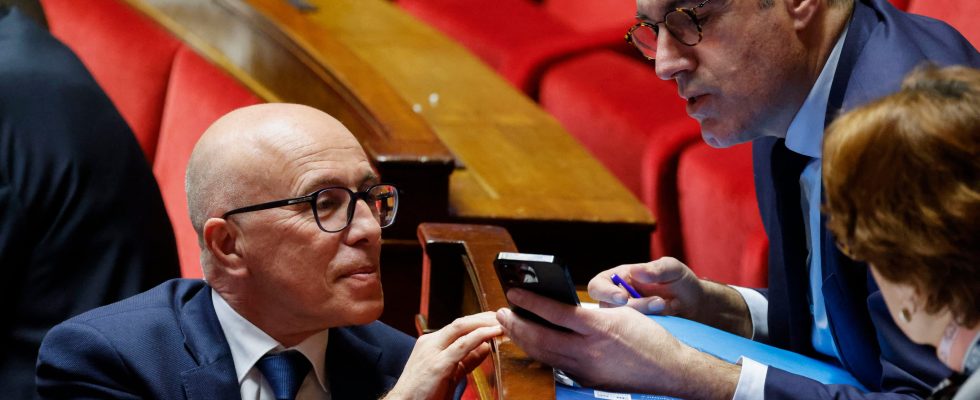Upon leaving the ENA, Laurent Wauquiez chose to join the Council of State rather than the diplomatic corps. This Tuesday, November 14, the putative candidate of the Republicans (LR) for 2027 nevertheless takes on the role of blue helmet. The president of the Auvergne-Rhône-Alpes region is becoming a guarantor of the unity of the right, threatened with fractures around the immigration bill. The man starts his day with a morning meeting with Bruno Retailleau. The boss of the LR senators praises the toughening of the text by the upper house, which sent a strong copy to the National Assembly. State medical aid is abolished, family reunification tightened and the payment of family allowances conditional on five years of residence in France.
A few hours later, Laurent Wauquiez heads to the meeting of the LR group at the Assembly. It is urgent to calm things down. The Darmanin bill has soured relations between Bruno Retailleau and the boss of LR deputies Olivier Marleix, who wanted the Senate to reject the text. The elected representative of Lot Aurélien Pradié denounces a “step back” of LR senators, guilty of a compromise with the centrists. The former minister plays appeasement. He salutes the ideological unity of his camp and calls not to antagonize the two chambers. “There is not a sheet of paper between us in the Assembly and the Senate on immigration. The Senate has passed a clear turning point in this text, but the question is what will happen in the Assembly “, he explains.
Here is the right with an argument. She applauds the turn of the screw of the senatorial right, but puts its political significance into perspective. The text from the Senate will in fact be examined from November 27 in the Assembly’s Law Committee. The left wing of the majority, which is well represented there, promises to deconstruct it and send a more moderate copy to the session on December 11. “Which text will come in the hemicycle?, asks Olivier Marleix. That of the Senate or a text unraveled by the majority and Sacha Houlié [NDLR : président Renaissance de la Commission des lois et ex-PS] ? The whole subject is there.”
In the short term, this fog serves the right. The president of LR Éric Ciotti and Olivier Marleix are careful not to issue a definitive opinion on the text of their fellow senators and are awaiting further action. And then, the right defends in unison its proposed constitutional law (PPLC) on immigration, expected on December 7 in the Assembly. The text allows for derogations from European law on migration matters and opens the field for a referendum on this subject. “If the majority is totally opposed to our proposal and the Senate text is largely deconstructed, there is no reason for us to vote for it,” judges Eric Ciotti.
The building built by LR is theoretical… therefore fragile. No one can predict the extent of the majority’s remodeling of the immigration bill. The equation contains several unknowns: what arithmetic weight does the fringe of the majority decided to rework the law in depth? What alliances of circumstances can tie together the left and the Renaissance on certain amendments? Mystery. Internal dissensions on the right may arise from the intensity of the rewriting. An LR executive is not far from burning a candle in the name of “Saint-Houlié”: “It would make our task easier for the majority to soften the text.” The unit is at this price.
Interior Minister Gérald Darmanin is counting on the support of around fifteen LR deputies to win. The man will not sit idly by in the Assembly. He exchanges with LR elected officials and will be careful to ensure that the text is not devitalized by the Macronist troops. “After the Senate, a second negotiation opens, more with the majority,” notes an executive advisor. “We will carry the compromise from the Senate to the Assembly,” Beauvau was assured before the examination of the text by the upper house. Gérald Darmanin finally intends to rely on the unconstitutionality of the suppression of the AME – a “legislative rider”, a provision without direct relation to the text – to bury the measure.
The mist envelops the immigration text. This is evidenced by the fate reserved for article 4 bis of the text, relating to the regularization of illegal immigrants exercising a profession in shortage. The device adopted in the Senate toughens the former article 3, red rag of the right. But no one knows how it will be modified by the majority in the Assembly. The right does not speak with one voice on the senatorial provision. Bruno Retailleau praises a tightening of existing law, while Olivier Marleix and Éric Ciotti display their skepticism. This vagueness will not be eternal, it will dissipate on November 27.
